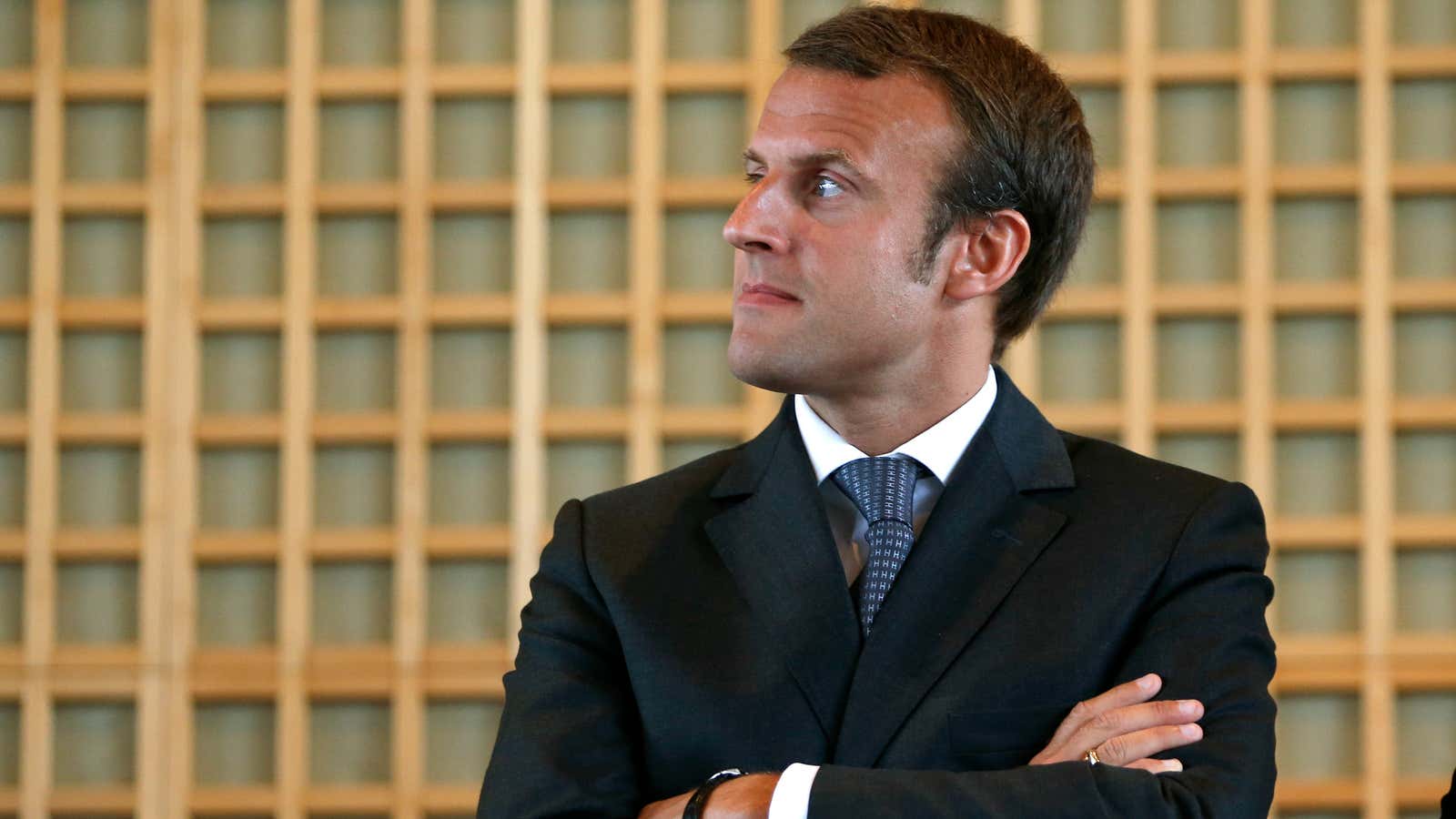Pollsters, and even a few confidantes in his inner circle, are already declaring Emmanuel Macron the next president of France.
In their reckoning, extreme right candidate Marine Le Pen, an anti-immigrant Europhobe who bashes globalization, has no credible path to victory in France’s May 7 run-off. But not everyone is so convinced.
Less sanguine observers of French politics remember just how far Le Pen fille has brought her formerly toxic National Front (FN) party into the mainstream since her father Jean-Marie Le Pen made it to the presidential run-off in 2002, sparking a mass protest movement that drew millions into the streets (Le Pen senior lost in a crushing defeat to Jacques Chirac.)
Today, Marine Le Pen still retains deep links to the nationalist ideology of her father. And despite her progression, French voters have seemed almost resigned to her success thus far. A handful of small demonstrations against Le Pen are attracting a few hundred activists at best. Meanwhile, far left populist Jean-Luc Melenchon, who worked hard to block Jean-Marie Le Pen 15 years ago, has refused to even say who he will be voting for. This stance explicitly encourages abstention and thus benefits Le Pen, say a growing chorus of detractors.
France is stuck “between the extreme right and the extreme market,” or between “a banker and a fascist”, said Melenchon backers as social media lit up with hashtags like “May 7 without me” and “Never Macron.”
Melenchon’s reluctance is only one of the factors that should worry Macron supporters, however.
“Contrary to 2002, the presence of Marine Le Pen in the second round has elicited no shock comparable to 15 years ago when her father beat [Socialist Prime Minister] Lionel Jospin,” wrote Gerard Courtois in Le Monde. ”It’s a confirmation that the strategy of entrenchment and banalization of the party of the extreme right has borne fruit.”
Not least of Macron’s problems is the nervousness among some of his own supporters. Critics suggest Macron is showing his youth and hubris, not realizing a “victory dinner” on April 23 after his first-round qualification, at a posh Paris left-bank brasserie would send the wrong message. The dinner, attended by family, aides and a few stars of the cultural scene, allowed his enemies to depict him as another complacent “bling-bling” politician along the lines of former president Nicolas Sarkozy.
Then there is the matter of Macron’s flat victory speech, which made no explicit reference to Madame Le Pen, nor conveyed any profound sense of the gravity of the choice now facing French voters. Author Nicolas Bedos depicted an almost-smug sounding oration was “not worthy of Macron or the Republic”. Macron will need to perform much better than than that during the final presidential debate on May 3.
Pundits convinced of a Macron win may also be taking for granted the tremendous upheaval this election has caused. The French political landscape is still reeling after neither the Socialists nor Les Republicains managed to boost their candidate into the final round. That neither major party was able to advance a contender introduces a whole other set of unknowns.
Supporters of Melenchon and the right’s Francois Fillon may well stay home, or in some cases, may vote for Le Pen. Bad luck may also increase abstention rates; the long-weekend loving French are scheduled to vote on the eve of a three-day holiday. The election falls on the day before the May 8 public holiday celebrating the Allied victory over Germany in 1945.
Outside factors like a big terrorist attack or meddling from Russian hackers could also change the outcome. Macron has allegedly already been targeted by Russia via hackers and the Kremlin’s propaganda outfits RT French and Sputnik, social media viral campaigns, and bots have him in their sights. Le Pen is much preferred in Moscow due to pro-Vladimir Putin views.
Donald Trump, too, was predicted to lose the US presidential election 15 days before November 8. Those familiar with the election may see echoes of Hillary Clinton in Macron; Clinton may have failed in part due to her inability to lure enough of the disgruntled backers of leftist rival Bernie Sanders.
“Macron has to be up to the task,” said Liberation’s editor Laurent Joffrin. “To win a majority he must rally millions of voters who are hardly ‘Macronian’. There is only one solution: to put the accent on what can unite…to hear the popular anger, moralize political life, respect the social equilibrium and reform Europe.”
If Macron believes he has already captured the French presidential palace, he may very well end up losing it.
